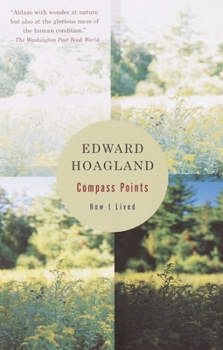Compass Points: How I Lived
Select Format
Select Condition 
Book Overview
For nearly fifty years Edward Hoagland has proven himself to be, in the words of William Kittredge, "one of our basic writers"--a writer whose novels, essays, and travel books have demonstrated a... This description may be from another edition of this product.
Format:Paperback
Language:English
ISBN:0375702407
ISBN13:9780375702402
Release Date:March 2002
Publisher:Knopf Doubleday Publishing Group
Length:304 Pages
Weight:0.55 lbs.
Dimensions:0.8" x 5.0" x 8.0"
Customer Reviews
1 rating
Read this compass.
Published by Thriftbooks.com User , 23 years ago
Edward Hoagland is a smart writer. He is "a student of catastrophe" (p. 33). The eleven essays in this new collection "burn with a hard bright thinker's light" (p. 211). They are about Hoagland's life of writing and wandering. We find him living "like a roustabout" in the Ringling Bros. circus at age 18 (p. 104), walking the sidewalks of Boston, Philadelphia, San Francisco, and New York (pp. 130-31), fighting fires in California (p. 133), and nearly losing his eyesight in 1988. "I would have eaten out of garbage cans, gone friendless, given my possessions away, surrendered a leg, to be able to see grass wave in the wind, not just hear it--see whose footsteps were approaching me, not to wait until they chose to speak" (p. 26), he writes in my favorite essay here, "In the Country of the Blind." We meet Hoagland's wives, old lovers, and Vermont hippie neighbors.Hoagland writes essays because "life is usually stasis, not a narrative; sadness, not a story" (p. 59). "The personal essay is meant to be like a household implement," he says, "a frying pan hanging from a punchboard" (p. 67). His writing is full of small, memorable insights. "You're going to be alone most of your life. If you run off the rails, you had better be good company for yourself" (p. 153). "It's not expensive to pay attention to the phases of the moon, to transplant lemon lilies, and watch a garter snake birthing thirty babies and a catbird grabbing some, or listen to the itchy-britches of the Canada geese as autumn waxes. We will be motes in the ocean again soon, leached out of the soil of some graveyard, and everlasting rocking" (p. 193).Hoagland's collection of essays is actually a memoir. Although I couldn't always relate to Hoagland's subject matter (e.g., his intellectual Manhattan life), I enjoyed reading these essays. At times I was distracted, however, when these essays wandered and digressed, like a compass without direction.G. Merritt






